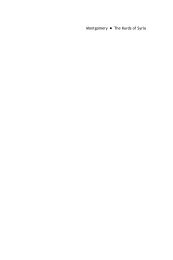Stateless Democracy
1RHiH4Y
1RHiH4Y
Create successful ePaper yourself
Turn your PDF publications into a flip-book with our unique Google optimized e-Paper software.
Introduction<br />
One of the most important secular political movements in<br />
the Middle East, the Kurdistan Workers’ Party (PKK) underwent<br />
a profound transformation in the 2000s, following the<br />
capture of its leader Abdullah Öcalan in 1999. After a long<br />
period of a national liberation struggle aimed at establishing<br />
its own state, the PKK changed its course towards a<br />
project of radical democracy based on the rejection of the<br />
state. The PKK, which had taken its orientation from the<br />
revolutionary left in Turkey, was providing a new basis for<br />
radical politics in today’s Turkey. In this article, we argue<br />
that the PKK reinvented itself ideologically through this<br />
transformation, and gave shape to new forms of politics on<br />
the basis of an exploration of the concept of democracy.<br />
Our discussion will explore the content of this new project<br />
and its practical implications. We will not discuss the organizational<br />
restructuring related to the PKK’s new political<br />
project, since we have discussed this elsewhere. 1<br />
Our study addresses a gap in Turkish and Kurdish studies.<br />
Although the Kurdish question in Turkey has been<br />
studied considerably, the focus has been on state discourse<br />
and security policy, with little attention devoted to the role<br />
of Kurdish agency itself, and in particular the PKK. Only<br />
few studies deal explicitly with the political ideology of the<br />
PKK. Furthermore, works on the PKK tend to treat the PKK<br />
as an anomaly, rather than attempting to make sense of it.<br />
In this article, we study the PKK’s political project as developed<br />
in the first decade of the new millennium and try to<br />
understand how the PKK itself makes sense of this project.<br />
The data for this article has been collected through a<br />
study of Öcalan’s defense texts and his prison notes, along<br />
160–161<br />
1 See Ahmet Hamdi Akkaya and Joost Jongerden,<br />
“Born from the Left. The Making of<br />
the PKK,” in Nationalisms and Politics in<br />
Turkey: Political Islam, Kemalism and the<br />
Kurdish Issue, Marlies Casier and Joost<br />
Jongerden eds. (London: Routledge, 2011),<br />
pp. 123–142.



